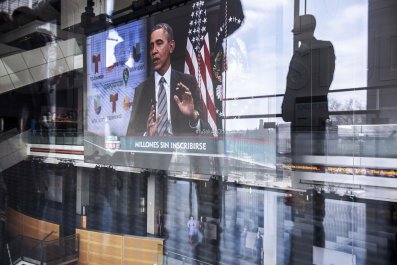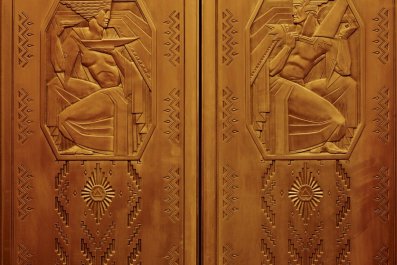The hotel bar TVs were all flashing clips of Senate intelligence committee chair Dianne Feinstein denouncing the CIA for spying on her staff, when I met an agency operative for drinks last week. He flashed a wan smile, gestured at the TV and volunteered that he'd narrowly escaped being assigned to interrogate Al-Qaida suspects at a secret site years ago.
"I guess I would've done it," he said, implying you either took orders or quit. But everybody in the counterterrorism program knew what was going on in those places, he said, and he was glad the agency found something else for him to do at the last minute. "Look what's happened."
Four years after Feinstein launched her probe of that interrogation program, her committee and the CIA are locked in a death-struggle over what can be released from the panel's 6,300-page, still-classified report. The impasse is bringing renewed attention to statements by former CIA and FBI agents that buttress the committee's all-but-official conclusion that the agency exaggerated the interrogation program's successes and minimized its abuses.
In early 2008, for example, the committee heard from Ali Soufan, one of the FBI's top former counterterrorism agents, who has since gone public with his criticism of the enhanced interrogation techniques, or EITs, that CIA contractors had used on top Al-Qaida captive Abu Zubaydah. "The staffers present were shocked," he wrote in his memoir, The Black Banners. "What I told them contradicted everything they had been told by Bush administration and CIA officials. When the discussion turned to whether I could prove everything I was saying, I told them, 'Remember, an FBI agent always keep his notes.' "
A Lebanese-American who was decorated by both the FBI and Defense Department for his counterterrorism work, Soufan laid out a case for the committee that CIA officials, chiefly Jose Rodriguez, the former CIA counterterrorism boss who ordered the destruction of interrogation videotapes, lied about the value of torturing detainees—to the point of altering the dates on documents to show a cause-and-effect that didn't exist.
"In this area, it's not a question of memory but of factual record," he later told the New Yorker's Amy Davidson. "There are now thousands of pages of declassified memos and reports that thoroughly rebut what Mr. Rodriguez and others are now claiming. For example, one of the successes of the EITs claimed in the now declassified memos is that after the program began in August 2002, Abu Zubaydah provided intelligence that prevented José Padilla from detonating a dirty bomb on U.S. soil, and identified Khalid Sheikh Mohammed as the mastermind of the September 11, 2001, attacks. Mr. Rodriguez has been repeating this claim.
"The reality," Soufan continued, "is that both of those pieces of intelligence were gained by my partner and me, with CIA colleagues, in early April 2002—months before the August 2002 start of the EIT program. But in the memos they were able to promote false facts, even altering dates, to make their claims work." An internal CIA memo claimed that Padilla was arrested in May 2003," Soufan told the committee. "In reality, he was arrested in May 2002. But saying 2003 fits with the waterboarding narrative."
Soufan also dismissed claims by Rodriguez and his allies that complaints about the value of harsh interrogations came solely from the FBI, a law enforcement agency that pulled out of the secret sites in 2002. "I totally disagree with this assertion..." Soufan told the Judiciary Committee in separate open testimony in 2009. "They"—CIA interrogators he worked with—"were one hundred percent supportive" of using nonphysical elicitation techniques that had worked for decades on hardened criminals. "Actually, the chief psychologist of the CIA, the forensic psychologist, objected to these [torture] techniques and he even left the location before I did," Soufan testified. "Their top interrogator was, I think, 100 percent in sync with our view, the FBI view, because he's a professional interrogator.
"Almost all the agency officials I worked with on these issues were good people, who felt as I did about the use of enhanced techniques as un-American, ineffective and harmful to our national security," Soufan added. Abu Zubaydah, he underscored, was waterboarded even before the technique was authorized.
For reasons that remain mysterious, the Senate intelligence committee has not taken the testimony of Glenn Carle, a senior high-ranking CIA officer who has gone public with his criticism of the interrogation program. Carle, who retired in 2007 as the CIA's Deputy National Intelligence Officer for Transnational Threats, was dispatched to interrogate an Afghan billed as an "Al-Qaida banker" at a secret site, later identified as Morocco, in 2002. A spy-operations veteran, Carle soon decided the detainee was nothing more than a lowly merchant with a passing connection to the terrorist group. But even after higher-ups knew they had the wrong man, he recounted in his memoir, The Interrogator: An Education, they held onto him.
"Some in the agency might not have wanted him released because so much of his case was based on erroneous assessments, that to have released him would have shown the operation to have been a house of cards, like so much of the war on terrorism," he told Harper's magazine.
Other CIA interrogators have told the intelligence committee similar tales. And then there is the matter of the records gathered by the committee—the "notes" Soufan referenced, as well as internal agency documents, that directly contradict the assurances CIA officials gave the committee that waterboarding was not only safe, effective and non-habit-forming, but integral to getting top Al-Qaida figures to talk.
To those who have followed the issue closely, the "revelations" in the committee report will come as no surprise: To a large extent, they've been out there all along. All's left is the reckoning-and that's the sum of all the CIA's fears.
Newsweek Contributing Editor Jeff Stein writes Spytalk from Washington, D.C.




















